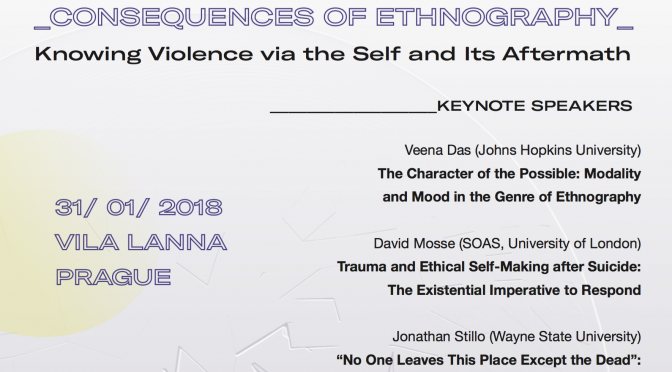Organisateurs : Michal Šípoš et Luděk Brož (Institut d’ethnologie, Académie tchèque des sciences)
avec le soutien de Strategy AV21, programme: « Global Con icts and Local Interactions: Cultural and Social Challenges »
Lieu : Villa Lana, Prague
S’enregistrer à la journée d’étude ici!
Voir le pdf de l’événement ici.
Argumentaire
As Sherry Ortner famously argued, ethnography in its minimal de nition is “the attempt to understand another life world using the self—as much of it as possible—as the instrument of knowing.” It is hardly surprising that conducting ethnographic research among/with survivors of violence—be it military, community, domestic, sexual, self-in icted or another form of violence— has a strong impact on the researcher. That impact, given the nature of ethnography, then directly translates into issues that are simultaneously personal and epistemological. Implications for the ethnographically knowing subject stretch well beyond feelings of empathy with research participants, as well as beyond the space-time of the eldwork. In this colloquium, we want to address methodological questions connected to knowing violence ethnographically, such as—but not limited to—the following:
- When conducting ethnographic eldwork, researchers are often confronted with survivors’ silence or with an urgent need to tell what survivors witnessed and endured. Does that translate into an equally polarised reaction on the side of the researcher?
In other words, can we see increased academic productivity in some cases among ethnographers, but inhibition of speaking-writing in other cases? - How can we speak of trauma of research without inappropriately shifting attention from research subjects to the researcher him- or herself?
- The needs of research subjects may significantly shape a researcher’s own trajectory in the eld. Should the researcher let research subjects take control over the project?
- Some ethnographers who publicly voice their research agendas are targeted by various actors, including authorities, hate groups or even the perpetrators behind the violence sufered by their research subjects. How can we methodologically conceptualise such encounters as part of ethnographic endeavour? What is the epistemic role of fear in such cases?
Programme
9:20 Accueil
9:50 Mots de bienvenue
10:00-11:00—Conférence plénière n° 1
Veena Das (Johns Hopkins University): The Character of the Possible: Modality and Mood in the Genre of Ethnography
11:00-12:00—Conférence plénière n° 2
David Mosse (SOAS, University of London): Trauma and Ethical Self-Making after Suicide: The Existential Imperative to Respond
12:00-13:00 Déjeuner
13:00-14:00—Conférence plénière n° 3
Jonathan Stillo (Wayne State University): “No One Leaves This Place Except the Dead”: Tuberculosis as a Socially Incurable Disease
14:00-14:15 Pause café
14:15-16:15—Table ronde
avec : Petra Ezzeddine (Université Charles), Jaroslav Klepal, Michal Šípoš and Václav Walach (Académie tchèque des sciences)

